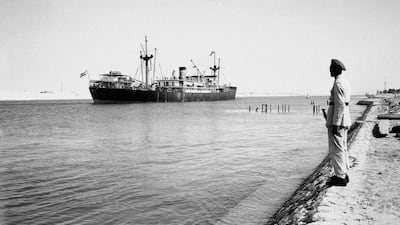The New Suez Canal, which officially opens today, is already freighted with Egyptian hopes and dreams in a way the historic 146-year-old original was not, at least for much of the first century of its existence. There are three main reasons for this sense of proud, joyful ownership of the new channel.
It was conceived by an Egyptian, not a foreigner. It was built with Egyptian pounds invested by ordinary Egyptians, not money laboriously raised on a sceptical international market by the Suez Canal Company, which was formed by a French diplomat in 1858.
The new 72km waterway was constructed under the Egyptian army’s supervision in just one year – not the decade it took the forced labour of tens of thousands of Egyptians to connect the Mediterranean with the Red Sea.
And finally, the new canal is nothing like the 1869 channel, which was the product of French ambition and ingenuity, pockmarked by competition among the imperial powers and nodded through by an Egyptian leader eager to please Paris.
The new canal is opening in a week that has done much to restore Egyptian confidence as it seeks to recover from four years of political and economic tumult. Last Thursday, president Abdel Fattah El Sisi and Saudi defence minister and deputy Crown Prince Mohammed bin Salman signed the Cairo Declaration, aimed at boosting bilateral military and economic ties. On Sunday, US secretary of state John Kerry restarted the so-called strategic dialogue with his Egyptian counterpart Sameh Shoukry in Cairo and announced that bilateral trade and investment consultations would resume this year.
It’s not just the start of a good week, Mr Shoukry told me later: “We Egyptians don’t think in terms of days and weeks. It’s the start of a good 100 years.”
The streets of the Egyptian capital bear witness to the surge of popular enthusiasm for Suez 2.0, billed as a key “national project” by the government.
It is not just the festive lights strung up around Tahrir Square and the blue and white banners and billboards everywhere, emblazoned with a drawing of a ship at sea and a smiling Mr El Sisi. Everyone is full of stories about the incredible diversity of those who bought the five-year canal investment certificate, which started at as little as 10 Egyptian pounds (Dh4.7).
To some, the euphoria over a waterway may seem inexplicable in the age of the information superhighway.
Surely ideas transmitted by fibre optic cable should be more important to today’s global economy than goods loaded on to shipping containers?
In the 19th century, the canal might have been an emblem of progress and a triumph of engineering, but its expansion (even if speedy) is surely not quite so mythical a feat in the 21st century?
In fact, more than a decade before Mr El Sisi first spoke of a new canal, historian Zachary Karabell questioned the modern relevance of the old waterway in Parting the desert: The creation of the Suez Canal.
It made good sense when it was built, he wrote, because “the journey from Europe to India was sliced from months to weeks, and the arduous route around the Cape of Good Hope was rendered obsolete”. But then the 20th century “reversed the process,” he argued.
Modern tankers could take the longer route and the cost was much the same, while the shorter route through the Suez meant paying canal dues.
“The navies of the world take advantage of the canal for reasons of convenience,” he wrote, “but outside of Egypt or Israel, Jordan or Saudi Arabia, it is no one’s strategic priority”.
This is a contentious point of view. But, the Suez Canal could at least lay claim to being unique in joining east and west, or as the late Palestinian-American professor Edward Said put it, destroying “the Orient’s distance, its cloistered intimacy away from the West, its perdurable exoticism”.
The New Suez Canal cannot claim that special status. So is the current canal fever no more than patriotic delirium? Not quite.
It is indisputable that the new canal will nearly double traffic by allowing ships to pass north and south concurrently. It will dramatically reduce waiting times for vessels.
It may, as hoped, boost investor confidence in the Egyptian government’s determination to do what it says and say no more than it can do.
It is possible that it will, as projected, almost treble annual earnings from the Suez for Egypt to $13 billion by 2023.
The most tenuous though may be the government’s grandest vision yet: the development of the Nile corridor as a whole, all along the new waterway, a gargantuan project that would need $150 billion and unwavering focus.
This is a bold plan but not in the way president Gamal Abdel Nasser remade the world nearly 60 years ago by nationalising the old Suez Canal.
That speech, in Alexandria, took the form of a passionate diatribe against colonialism. It electrified Egyptians, had enormous consequences for British and French influence and promoted a cathartic pan-Arab nationalism, albeit one that resulted in several misguided initiatives.
In some ways, the new canal makes the Suez route Egyptian in ways that just nationalising it never could.
Rashmee Roshan Lall is an itinerant writer on world affairs
On Twitter: @rashmeerl


